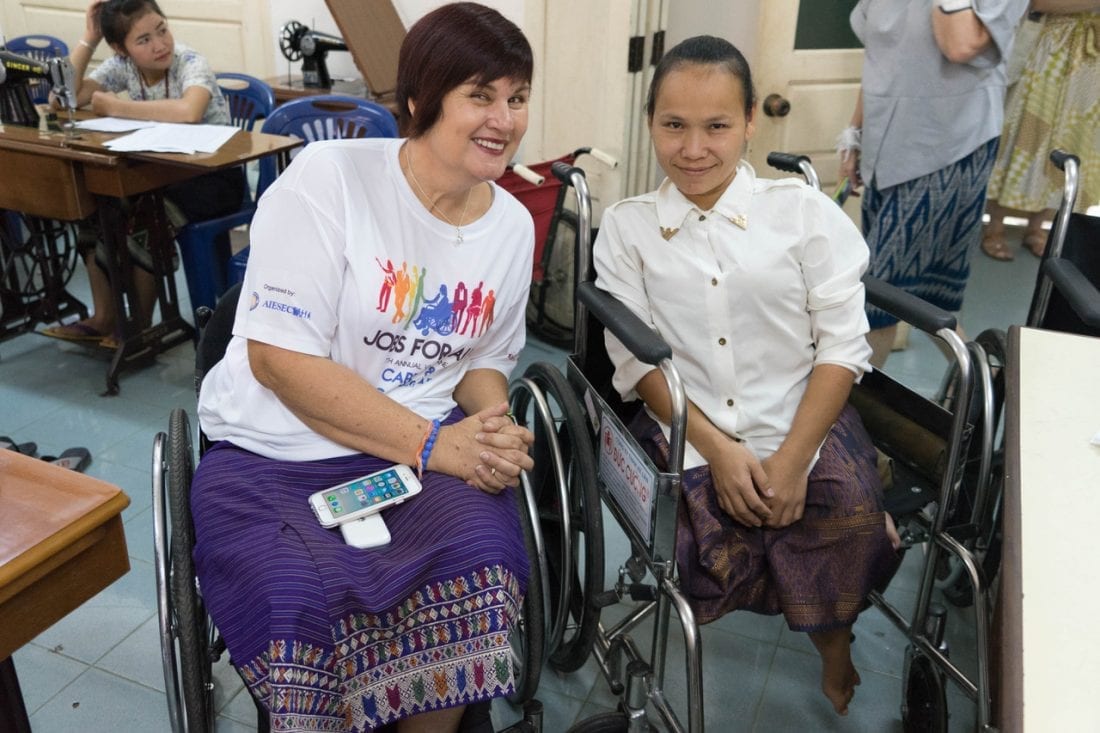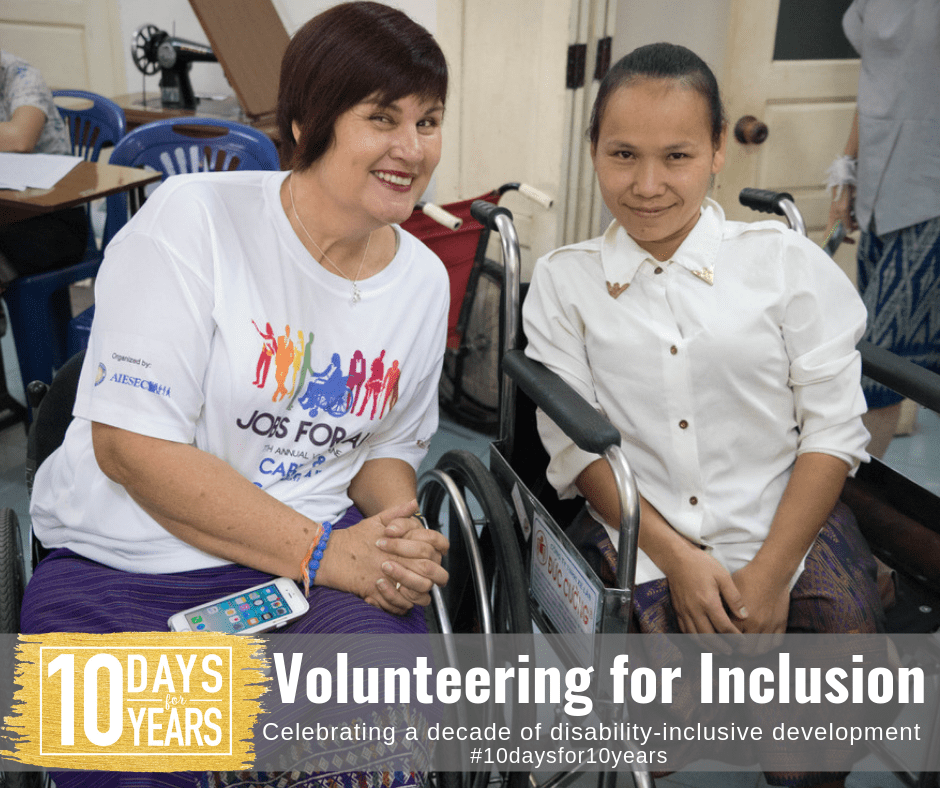Volunteering for Inclusion
Good development outcomes are built upon the work of a wide range of experts and advocates, from paid employees to local leaders to committed volunteers. Australians have left the prints of volunteer-worn boots on the ground around the world; leading work that contributes to our overall development objectives – including in disability-inclusive development.
The first Development for All strategy for disability-inclusive development, introduced in 2009, highlighted a dual approach to furthering disability inclusion outcomes through volunteering: it affirmed the value of volunteer assignments in the disability sector—including in rehabilitation training and services, disability awareness programs, and sports for people with disabilities—and profiled the role for volunteers with lived experience of disability. This focus was continued in 2015’s Development for All: Strategy for strengthening disability-inclusive development in Australia’s aid program, which outlined a policy commitment ‘to support people with disabilities to participate fully as volunteers, and to ensure that disability is a focus area for volunteer assignments.’[1]
This policy commitment has yielded real outcomes in Australia’s international development volunteer program: by 2017, the proportion of volunteers undertaking disability-focused assignments had increased to 18 per cent and the number of mobilised volunteers identifying as having a disability had risen from four in 2012-13 to 15 in 2015-16.[2]
These increases have been intentional, not incidental.
Volunteering as a person with disability can be challenging, with many volunteers experiencing heightened barriers and social isolation. Alternative models of volunteering, such as the Disability Empowerment Skills Exchange, have therefore been particularly valuable for providing flexible opportunities such as short-term placements with disabled people’s organisations (DPOs) in Asia and the Pacific.
Chris Kerr participated in the program, leading a group of volunteers to work in Laos in the nation’s capital, Vientiane. Chris, a wheelchair user, volunteered with the Laos Disabled People’s Association (LDPA) and the Laos Disabled Women’s Development Centre (LDWDC). The LDWDC provides training for women with disabilities to learn handicraft and sewing skills as well as basic English. Chris and her team supported the LDWDC to develop a training plan incorporating new ways to strengthen the educational experience for the women attending the Centre. Chris is a passionate advocate for the rights of people with disabilities and now after volunteering in Laos, is also an advocate for more people with disabilities to embark on a volunteer journey.
‘It sounds really clichéd but it’s true – it was life-changing to do something so out of the box… We need more people with disabilities volunteering overseas,’ emphasises Chris.
DFAT’s Disability Initiative Grants have also furthered the reach of disability inclusion across the volunteer program by funding small projects promoting inclusion. Successful projects have been both disability-specific and mainstream in nature, reflecting the twin-track approach embedded in the Development for All strategies. Ranging from a forum to consolidate sign language across Bhutan; to providing training in community-based mental health education in the Philippines; to developing a weekly radio program presented by people with disabilities in Timor-Leste, each project has leveraged volunteers’ deep knowledge of their organisations and contexts to achieve real impact for people with disabilities.[3]
Australians with disabilities are engaged in global issues and have considerable expertise in human rights, inclusive development and other specialised fields. Although the contributions of people with lived experience of disability to development outcomes are substantial, pathways to entering the development sector can be littered with barriers. The Development for All strategies have played a significant role in dismantling barriers to volunteering in international development, and living up to the Australian aid program’s values of inclusion. If Australia is to continue furthering its leadership in disability-inclusive development, the engagement and expertise of people with disabilities as both paid and volunteer development actors must be central to the approach.

Caption: Chris Kerr (left) with a student Mrs Thongbai in the sewing room at the Laos Disabled Women’s Development Centre. Copyright: Chris Kerr.
Information, video and photos used in partnership with Australian Volunteers International.
References
[1] Department of Foreign Affairs and Trade, 2015. Development for All 2015-2020: Strategy for strengthening disability-inclusive development in Australia’s aid program. DFAT, Canberra. p. 13.
[2] Office of Development Effectiveness, 2018. Development for All: Evaluation of Progress Made in Strengthening Disability Inclusion in Australian Aid. DFAT, Canberra. p. 45.
[3] Department of Foreign Affairs and Trade. Australian Volunteers for International Development (AVID) Disability Initiative Grants. URL linked here
Sign up to receive the daily campaign article:
By signing up you will receive a daily email from the 10 days for 10 years campaign between 29 April to 10 May 2019.
10 days for 10 years
In partnership with CBM Australia and other ADDC partner organisations, the 10 days for 10 years campaign runs from 29 April to 10 May 2019. The campaign is celebrating the achievements in disability-inclusive development (DID) within the Australian aid sector, particularly those led or made possible by Australian aid under the first and second Development for All strategies. Articles will be released daily here on the ADDC website.
Follow the campaign via the hashtag #10daysfor10years and follow @ADDCnews on Twitter, Facebook and LinkedIn.
- 10 days for 10 years
- Day 1 – A Legacy of Leadership
- Day 2 – Beyond the Mainstream
- Day 3 – Inclusion at the Intersection
- Day 4 – Disabled People’s Organisations Leading Change
- Day 5 – Recognising Diversity within Disability
- Day 6 – Reporting from the Shadows
- Day 7 – Volunteering for Inclusion
- Day 8 – Evolution of Inclusion
- Day 9 – Education for All
- Day 10 – Building on Success

